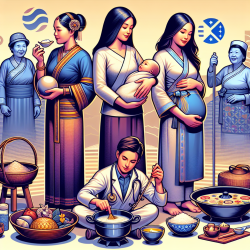The postpartum period is a critical time for new mothers, and for Southeast and East Asian (SEEA) immigrant mothers, this time is often marked by unique cultural practices. These practices, commonly referred to as "doing-the-month," are deeply rooted in tradition and aim to restore balance and promote recovery after childbirth. A recent meta-ethnography study has shed light on these practices, offering valuable insights for practitioners looking to improve their skills and provide culturally sensitive care.
The Importance of Postpartum Cultural Practices
For SEEA mothers, "doing-the-month" involves a series of rituals designed to restore the body's balance after childbirth. These practices include dietary restrictions, rest, and avoiding certain activities. The study highlights three main themes:
- Importance of Maintaining Practices: Many SEEA mothers value these traditions as they believe they prevent illness and promote long-term health.
- Barriers to "Doing-the-Month": Immigrant mothers often face challenges such as lack of social support and financial constraints that hinder their ability to fully engage in these practices.
- Modification Over Tradition: Some mothers adapt these practices to fit their current lifestyle and circumstances, balancing practicality with tradition.
Challenges Faced by Immigrant Mothers
The study reveals that SEEA immigrant mothers often struggle with maintaining their traditional postpartum practices due to various barriers. These include:
- Lack of Social Support: Being far from family members who traditionally assist during the postpartum period can make it difficult for immigrant mothers to follow cultural practices.
- Financial Constraints: The cost of living in Western countries can force mothers to prioritize work over traditional rest periods.
- Cultural Alienation: Healthcare providers may not always be aware of or sensitive to these cultural practices, leading to feelings of alienation among immigrant mothers.
Implications for Practitioners
Maternity care providers play a crucial role in supporting SEEA mothers during the postpartum period. By understanding and respecting these cultural practices, practitioners can offer more effective and culturally affirming care. Here are some steps practitioners can take:
- Cultural Competence: Educate yourself about the cultural backgrounds and traditional practices of SEEA mothers.
- Individualized Care Plans: Develop care plans that incorporate both traditional practices and modern medical advice tailored to each mother's needs.
- Enhance Social Support: Facilitate connections with community resources and support networks that can help bridge the gap left by distant family members.
The Path Forward
This meta-ethnography underscores the importance of culturally sensitive care in improving maternal health outcomes for SEEA immigrant mothers. Practitioners are encouraged to delve deeper into this area of research to better understand the complexities and nuances involved. By doing so, they can enhance their practice and contribute to positive health outcomes for this diverse group of mothers.
To read the original research paper, please follow this link: Immigrant Southeast and East Asian mothers’ transnational postpartum cultural practices: A meta-ethnography.










